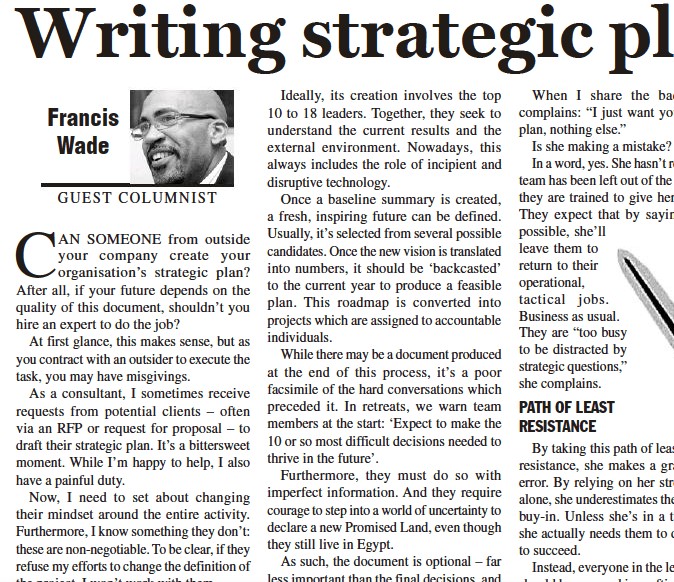Can someone from outside your company create your organization’s strategic plan? After all, if your future depends on the quality of this document, shouldn’t you hire an expert to do the job? At first glance, this makes sense, but as you contract with an outsider to execute the task, you may have misgivings.
As a consultant, I sometimes receive requests from potential clients (often via an RFP) to draft their strategic plan. It’s a bittersweet moment. While I’m happy to help, I also have a painful duty.
Now, I need to set about changing their mindset around the entire activity. Furthermore, I know something they don’t: these are non-negotiable. To be plain, if they refuse my efforts to change the definition of the project, I won’t work with them. What’s my reasoning for such a drastic demand?
- Strategic Plans Are Not Documents
While it’s the norm to equate a strategic plan with a document, the reality is quite different. It all has to do with where the document originates and what it’s intended to do.
The best plans lay out a very specific future. This is no 3-line vision statement with vague, undated aspirations which cannot be measured. Instead, it defines a detailed outcome and a realistic pathway to get there.
Ideally, its creation involves the top 10-18 leaders. Together, they seek to understand the current results and the external environment. Nowadays, this always includes the role of incipient and disruptive technology.
Once a baseline summary is created, a fresh, inspiring future can be defined. Usually, it’s selected from several possible candidates. Once the new vision is translated into numbers, it should be “backcasted” to the current year to produce a feasible
plan. This roadmap is converted into projects which are assigned to accountable individuals.
While there may be a document produced at the end of this process, it’s a poor facsimile of the hard conversations which preceded it. In retreats, we warn team members at the start: “Expect to make the 10 or so most difficult decisions needed to thrive in the future.”
Furthermore, they must do so with imperfect information. And they require courage to step into a world of uncertainty to declare a new Promised Land, even though they still live in Egypt.
As such, the document is optional – far less important than the final decisions, and the struggle to make them. Instead, the RFP I receive should focus on following rigorous, analytic steps as a team.
- There is No Real Delegation
However, there are companies in which the norm involves a CEO spending a weekend at a resort, locked away. During her hiatus, she writes the entire strategic plan. Her team receives the document on Monday morning.
One year, she may decide that she’s busy or needs outside input. She requests a quote from a consultant to perform the task instead. She explains: “My staff always agrees with the plan I come up with, and hardly give any comments. You should have no problem.”
When I share the bad news, she complains. “I just want you to write the plan, nothing else.” Is she making a mistake?
In a word, “Yes.” She hasn’t realized that her team has been left out of the process. Now, they are trained to give her “lip service.” They expect that by saying as little as possible, she’ll leave them to return to their operational, tactical jobs. Business as usual. They are “too busy to be distracted by strategic questions”, she complains.
By taking this path of least resistance, she makes a grave error. By relying on her strength alone, she under-estimates the need for their buy-in. Unless she’s in a tiny company, she actually needs them to do much more to succeed.
Instead, everyone in the leadership team should be engaged in crafting the strategic plan. This is the only way for the most important stakeholders to make challenging decisions. When she disappears for the weekend, she discounts their input.
Furthermore, she acts as if implementing the strategic plan involves no more than ordering people to play their part. This approach is far inferior to the alternative: involving the leadership team so that they can, in turn, engage others.
The bottom-line is, she’s been following a process that doesn’t work. Delegating it to an outsider only makes things worse.
If a consultant is employed, that may help. But the outside assistance shouldn’t diminish the challenge, it should only improve the experience and the final output.
True strategic planning, especially in these turbulent times, is no vacation-like exercise. It involves far more than prose. Instead, the stakes should always be high. The responsibility to confront tough choices and implement them lies with the leadership team.

